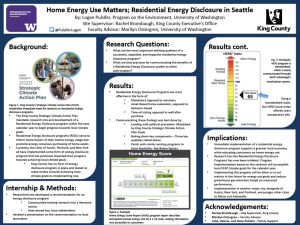Home Energy Use Matters: Residential Energy Disclosure in Seattle
Mandating residential energy disclosure will force the local economy to place a greater weight on home efficiency when buying a home. This will ultimately help us achieve our County’s energy reduction goals for 2030. This problem urged the questions of- What form of energy disclosure is most effective for King County? As well as, how do we best communicate these ideas to the relevant stakeholders to pass this bill? I asked these questions in order to practice environmental research communications, as well as perform some much needed research into these topics for The King County Executive Office.To answer these, I followed these methods during my internship. For the first five weeks, I researched and synthesized the findings of existing programs as well as conducting interviews with the realtors association, the community, and the along County climate team. Following this I built and iterated a slide deck that helped me communicate these results. I found that the most effective form of energy disclosure came in the form of a mandatory, asset-based, and at the time of listing audit that placed each home on a standardized scale displaying its efficiency. These results are significant because it paves the way for future county legislation. Further, these results maximize future home equity in regards to sustainability. Finally, this research helps us as a county stay on track towards achieving our 2030 climate goals.
